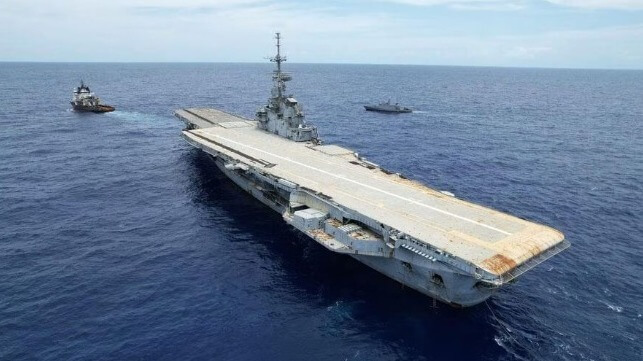Brazilian Navy Sinks the “Toxic Carrier” NAe São Paulo

Despite ongoing protests and a last-minute appeal to the courts, the Brazilian Navy confirmed that it has sunk the decommissioned aircraft carrier NAe São Paulo far off the coast of Brazil bringing to close a six-month drama that saw the vessel caught at sea. Environmental groups continue to call for investigations saying they believe the vessel contained large amounts of asbestos, PCBs, mercury, and other harmful chemicals that will now enter the marine environment.
Marinha do Brasil (the Brazilian Navy) issued a brief statement late on Friday, February 3, confirming that the operation had been completed. Few details were provided other than to say the vessel was sunk in Brazilian jurisdictional waters over 200 miles from the northeast coast. They estimated the water depth in the area at greater than three miles.
“The area for the final disposal of the hull was selected based on studies carried out by the Navy Hydrography Center and the Institute of Studies of the Sea Almirante Paulo Moreira. The analysis considered aspects related to navigation safety and the environment, with special attention to the mitigation of impacts on public health, fishing activities, and ecosystems,” the Navy wrote.
Brazil’s Federal Public Ministry (MPF) had filed an appeal before the Federal Regional Court on Thursday again attempting to block the Navy from proceeding with the sinking. They highlighted reports from Brazil’s environmental agency Ibama which estimated that the vessel contains 9.6 tons of asbestos in addition to 644 tons of paint and other hazardous materials. The day before a lower court refused a request to issue a temporary injunction against the sinking.
The Navy said in its statement that the controlled sinking had proceeded as planned with reports that they set off multiple charges in the hull of the carrier. Earlier reports had indicated that as many as 21 compartments in the hull had already been compromised with an increasing volume of water building up in the hull. The Navy said, “The procedure was conducted with the necessary technical competence and safety by the Brazilian Navy, in order to avoid logistical, operational, environmental, and economic losses to the Brazilian State.”
The Navy had contended in recent weeks that the hull of the aircraft carrier which was built by the French as the Foch in the late 1950s was rapidly detreated after having been at sea since August and completing two Atlantic crossings. Brazilian ports refused to let the scrapper and the tug they had hired dock the vessel after it returned to Brazil in October after Turkey withdrew the import licenses over concerns that the environmental reports were inaccurate.
Brazil in a previous statement attempted to place blame for the situation on Turkey for not permitting the green recycling to proceed and the scrapper for failing to contract for repairs to the hull. While the Navy took control of the vessel in late January they said it was still the scrapper’s responsibility. The Turkish company Sok Denizcilik Tic Sti and MSK Services, which was contracted to oversee the delivery of the vessel, responded by saying that no port or shipyard in Brazil was willing nor the Brazilian Navy to receive the ship. They said the project had cost them millions of dollars and under international treaty, the disposal of the ship was Brazil’s responsibility.

that matters most
Get the latest maritime news delivered to your inbox daily.
"What happened last night will go down in history as the single most blatant violation of chemicals and waste treaties ever to take place at the hands of a country,” said Nicola Mulinaris, Senior Communication and Policy Advisor for NGO Shipbreaking Platform in a written statement. “An independent inquiry as to why this took place must be undertaken to ensure that such a thing never happens again."
Other environmental organizations including Greenpeace also issued statements condemning Brazil for sinking the carrier. The Basel Action Network said it was shocked by Brazil’s actions while it was asking for the vessel to be docked and re-inspected. The NGOs said they consider the deliberate dumping an environmental tragedy as the heavy metals and the PCBs will continue to leach into the marine environment in the foreseeable future.
